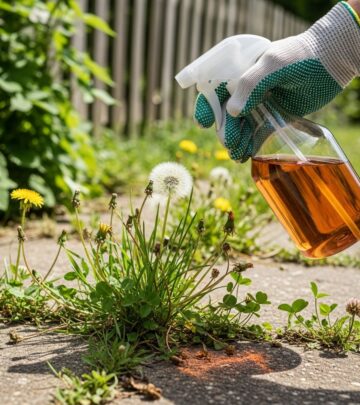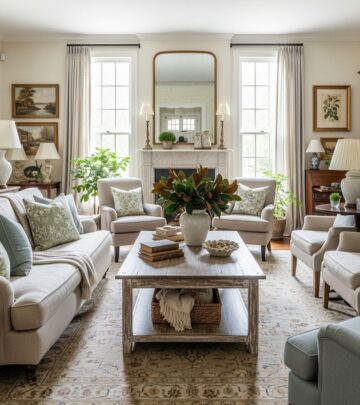Why Using Gasoline to Remove Wasp Nests Is a Dangerous TikTok Trend
Practical pest control solutions that safeguard your home and preserve local wildlife.

As social media continues to influence home maintenance practices, a recent trend on TikTok has alarmed pest control experts, firefighters, and environmentalists. The fad? Using gasoline to destroy wasp nests—purportedly a quick and effective hack for an age-old nuisance. However, beneath its viral popularity lurk enormous safety, health, legal, and environmental risks. This article examines in depth why using gasoline to kill wasps is not only reckless, but also illegal in many jurisdictions, and offers practical, safer alternatives endorsed by experts.
The Rise of a Dangerous Viral Trend
In 2023, a TikTok video amassing millions of views kickstarted a phenomenon: people sealing a cup of gasoline over an active wasp nest in an attempt to eradicate its inhabitants. While the video demonstrates the apparent effectiveness of this method, underlying consequences are dire. Videos featuring gasoline are often shared with little warning about the hazards, leading many viewers to attempt the process themselves without realizing the risks involved.
- Gasoline is highly flammable, making this method especially perilous near dwellings, structures, or during warm weather when evaporation rates and ignition risk are high.
- Gasoline vapors are hazardous, exposing users (and bystanders) to severe health consequences through inhalation or skin contact.
- Environmental contamination is likely, as improper disposal of gasoline or soaked nests poisons soil and water sources.
- Legal ramifications exist for using unregistered chemicals for pest control, violating both state and federal regulations.
Examining the Major Risks of Gasoline Wasp Removal
1. Fire and Explosion Hazards
Gasoline is one of the most volatile and flammable household substances. When brought near an open flame, sparks, sun-heated metal, or even static electricity, it can ignite almost instantaneously.
- Explosion and rapid fire spread: Attempting to douse wasp nests, often in outdoor eaves or wooden structures, poses the immediate threat of setting homes or yards ablaze—a risk many users vastly underestimate.
- Difficult-to-control blazes: Even a small gasoline spill can propagate quickly, especially in dry, grassy, or wooded suburban and rural areas.
- Case in point: According to fire safety consultants and entomologists cited in media investigations, “seconds away from everything going wrong, ending up doused in gasoline and covered in wasp stings.”
2. Toxic Fumes and Health Risks
Gasoline fumes contain a mixture of harmful substances, including volatile organic compounds (VOCs) and known carcinogens.
- Inhalation hazards: Breathing gasoline fumes can cause dizziness, headaches, nausea, respiratory distress, and, in severe cases, unconsciousness or death.
- Skin and eye exposure: Gasoline is a chemical irritant, capable of causing severe burns and potential eye damage.
- Environmental vapor risk: Fumes can drift, exposing children, pets, and neighbors to toxic chemicals far from the original wasp nest.
3. Environmental Impact
The environmental repercussions of using gasoline are both immediate and far-reaching:
- Soil and water contamination: Gasoline spills leach toxins into the ground, harming not just insects but also beneficial soil organisms and plants.
- Harmful to wildlife: Polluted runoff can adversely affect birds, mammals, amphibians, and aquatic life.
- Long-lasting impact: Soil and water polluted by gasoline can remain hazardous for years—well beyond the disappearance of the wasps themselves.
4. Legal and Regulatory Issues
Most countries, including the United States, regulate pest control substances through environmental agencies such as the EPA. Using unregistered chemicals—including household products like gasoline—for exterminating pests is illegal in many states and may result in fines, prosecution, or penalties.
- Pest control laws: Only products labeled and registered as pesticides can be legally used to kill insects including wasps.
- Professional standards: Licensed pest control operators are never permitted to use gasoline for insect eradication—doing so puts their licenses and livelihoods at risk.
Debunking the Efficacy of Gasoline: Does It Really Work?
While gasoline’s asphyxiating vapors may kill visible wasps in a nest, experts highlight its unreliability and inefficiency:
- Limited reach: Gasoline seldom penetrates complex nest structures or underground nests, allowing many wasps to survive and potentially become more aggressive.
- Collateral damage: Attempting to lynch a cup of gasoline to a nest invariably exposes the applicator to angry, stinging wasps, particularly if the nest is not fully saturated or if the nest is disturbed.
- False sense of security: Surviving wasps may establish new nests elsewhere or within the home, perpetuating the problem.
Common Misconceptions Propagated by Social Media
Many TikTok “life hacks” present dangerous shortcuts as easy fixes. In the case of gasoline and wasp nests, the following myths must be addressed:
- Myth: Gasoline is a cheap, effective alternative to store-bought pesticides.
Fact: The risks far outweigh the minimal cost savings. Legality and environmental protection should not be sacrificed for convenience. - Myth: The method is “natural” since gasoline comes from crude oil.
Fact: Gasoline is a highly refined, toxic chemical unsuitable for use on living organisms—including pests—outside controlled fuel systems. - Myth: Gasoline poses little risk as long as you are careful.
Fact: Fires, toxic exposure, and legal violations can happen despite precautions, often with little to no warning.
Expert Advice: What to Do If You Find a Wasp Nest
Discovering a wasp nest under an eave, in your shed, or your garden is unnerving, but there are safe, proven approaches to eliminate them without risking your safety or breaking the law.
Safer Alternatives to Gasoline for Wasp Control
- Aerosol wasp sprays: Readily available at hardware stores, these products allow application from a safe distance (10–20 feet), quickly disabling wasps and saturating the entire nest.
- Hire a professional: Licensed pest control specialists have access to registered chemicals and equipment, and follow strict safety protocols designed to minimize risk.
- Apply non-toxic traps: Wasp traps using sugar water, vinegar, and commercial attractants capture foraging wasps without risking fire or chemical pollution.
- Preventive measures: Seal entry points, screen vents, and keep outdoor eating areas clean to discourage wasp colony establishment.
| Unsafe Method | Risks | Safe Alternatives |
|---|---|---|
| Gasoline-soaked cup over nest | Fire, explosions, toxic exposure, environmental damage, legal issues | Aerosol sprays, professional removal, wasp traps, prevention |
How to Dispose of a Wasp Nest Safely
Once you have neutralized a wasp nest using legal and safe methods, it’s crucial to dispose of the nest and any chemicals appropriately:
- Wear gloves and long sleeves when removing the empty nest.
- Place the nest in a sealed plastic bag before disposal to prevent lingering wasps from escaping.
- If commercial pesticides or sprays were used, follow manufacturer’s instructions for disposal of containers and residues.
- Never dispose of gasoline or gasoline-soaked items in household trash or pour them down drains: take them to an authorized hazardous waste facility or arrange for special collection.
Environmental Responsibility and the Bigger Picture
Ultimately, embracing safe pest control methods protects not only your health and property but also your local ecosystem. Unnecessary chemical contamination can devastate pollinators, beneficial insects, birds, and aquatic wildlife. Choosing not to follow dangerous viral trends is a responsibility homeowners share to ensure a cleaner, safer future for communities and the natural world.
Frequently Asked Questions (FAQs)
Q1: Is gasoline an effective way to kill wasps?
While gasoline fumes can kill exposed wasps, the risks—fire, toxicity, environmental damage, legal liability—far outweigh any benefit. Many wasps may survive or rebuild nests elsewhere.
Q2: What should I do if I accidentally spill gasoline while attempting to use this hack?
Immediately move away from the spill, avoid igniting any flames, and ventilate the area. Absorb the spill with cat litter or sand, place it in a sealed container, and take it to a hazardous waste facility. Do not attempt to hose down or burn the spill.
Q3: What’s the safest way to remove a wasp nest at home?
Use insecticides labeled for wasps, apply at dusk or dawn (when wasps are least active), and only if the nest is easily accessible. When in doubt, call a professional pest control company to ensure safe and thorough removal.
Q4: Are there eco-friendly methods to prevent wasps?
Yes. Regularly inspect and seal potential nesting sites, use decoy nests, and maintain outdoor cleanliness to make your property less attractive. Traps made from non-toxic baits (sugar water, vinegar) are also helpful.
Q5: Is it legal to use gasoline for pest control?
No. The EPA regulates which chemicals can be used for controlling pests, and gasoline is not among them. Violations may result in significant fines and even criminal charges in some cases.
Key Takeaways
- Never use gasoline or other unapproved chemicals to remove wasp nests. The fire, health, and environmental hazards are severe and the practice may be illegal.
- Rely on safe alternatives like aerosol insecticides, professional pest control, and non-toxic traps for effective results without endangering yourself, your family, or the environment.
- Spread awareness: Inform friends, family, and online communities about the dangers of viral home “hacks” that involve risky or illegal substances.
References
- https://www.accio.com/business/gasoline_wasp_trend
- https://abctermite-pest.com/the-hazards-of-using-gasoline-to-eradicate-wasps/
- https://www.youtube.com/watch?v=F_Vq8xVjrEE
- https://www.housedigest.com/1883457/tiktok-hack-remove-wasps-dangerous-gasoline/
- https://www.cleggs.com/blog/can-you-kill-wasps-with-gasoline/
- https://www.allamericanpestcontrol.com/blog/post/can-you-kill-wasps-with-gasoline
- https://www.countryliving.com/home-maintenance/cleaning/a44563522/tiktok-trend-gasoline-wasp-nest-extremely-unsafe/
Read full bio of Sneha Tete










